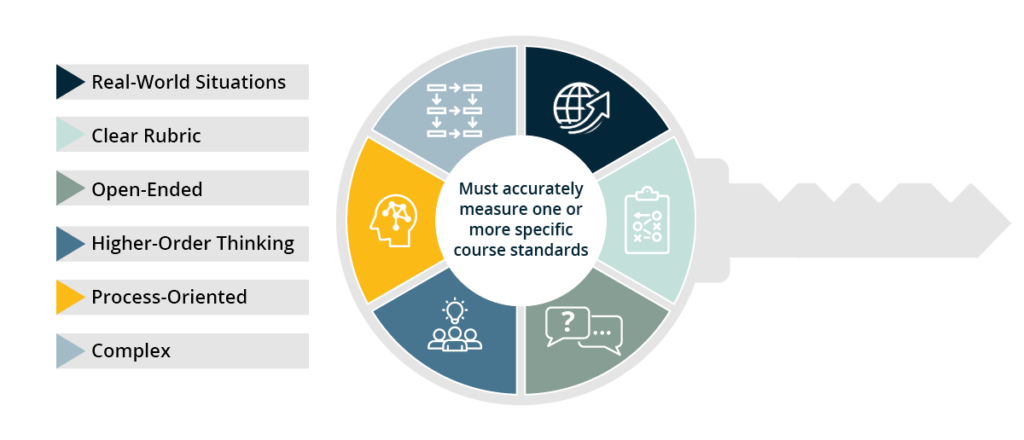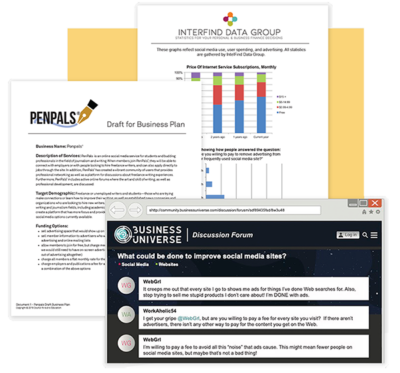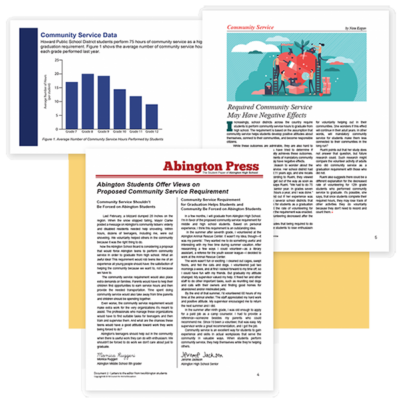 What Are Performance Assessments and Why They Matter
What Are Performance Assessments and Why They Matter
Performance assessments are a key tool for educators to measure and evaluate student understanding of academic content, and the application of higher-order skills.
Interested in learning more about performance assessments and how they can be used to measure students’ academic knowledge and higher-order skills, and provide data to guide instruction?
What are Performance Assessments?
Performance assessments typically involve tasks that challenge students to use their higher-order skills, such as critical thinking and problem solving.
Key Characteristics of Performance Assessments

Performance assessments must be…

Authentic to real-world situations: A primary goal of education is to ensure students are prepared to leave school ready for any challenge. A well-written performance-based assessment will include scenarios that students will likely face outside the school setting.

Presented with a clear rubric: As with any type of assessment or measurement tool, it is important to ensure that students understand what is required of them and how the assessment works. Performance assessments should be presented with a clear rubric detailing instructions and timeframe.

Open-ended: Real-life situations are often complex and cannot be approached with a single solution. Quality performance assessments allow students to explore a given topic in a way that they could arrive at a number of “correct” solutions or present a final solution in various ways.

Centered in higher-order thinking: In the workplace and in day-to-day life, students need to possess strong higher-order skills such as problem solving, critical thinking, and effective communication. In performance assessments, a considerable portion of a student’s score is based on their ability to demonstrate their knowledge and skills used to complete the task. This includes their ability to synthesize information, apply evidence, analyze, problem solve, and apply other critical higher-order skills.

Process-oriented: Each student has their own unique way of thinking and approaching problems. The most effective performance assessments offer multiple avenues for completing the task and encourage exploration, learning, analysis, and development of higher-order skills. Students are evaluated based on their ability to apply their knowledge toward achieving the end result.

Complex: Outside of the classroom, individuals must rely on multiple skills to complete a work or life task. Therefore, performance assessments must require students to draw from a variety of skills and information to complete their performance task.

Educators Are Looking for a Better Way to Measure Competency
In the 1990s, performance assessments became a valid alternative to traditional multiple-choice tests. But in the years that followed, legislative requirements shifted the emphasis to standardized testing, which caused a decline in nontraditional testing methods (Darling-Hammond & Adamson, 2013).
Today, many states and districts are turning to performance assessments as a more authentic measurement tool.
Why Do Performance Assessments Matter?
A well-designed performance assessment can help educators:
- Measure how well students comprehend the material
- Address any misunderstandings students may have
- Provide additional instruction to enhance learning
Performance assessments also help students acquire crucial higher-order skills such as teamwork, problem solving, critical thinking, and more. As students take the assessment and receive ongoing guidance, they acquire and practice these skills. Students who do well on performance-based assessments are well-equipped to face real-world challenges.

A More Comprehensive Assessment
Performance assessments provide insight into how well students are able to apply the skills they learn in school to real-world situations they will encounter in their lives and careers.
Traditional assessments usually consist of true/false, matching, or multiple choice questions. They are more standardized and straightforward to grade. However, a drawback of these assessments is that they only evaluate theoretical knowledge and its isolated application, facts, or memorized data at lower-level thinking skills.
Real-World Application/Practice
Compared with multiple-choice or short-answer exams, performance assessments are more realistic and applicable to real-life problems. They require students to employ complex, higher-order thinking abilities such as reasoning, problem solving, and collaboration with others. They also provide learners with opportunities to apply their knowledge in practical, real-world scenarios. This is possible because performance-based assessments replicate genuine situations and comprise tasks that urge learners to link the gap between theory and practice.
Measure Your Skills:
Try Our Higher-Order Skills Performance-Based Assessment
Preview CAE’s performance assessment and the type of scenarios CAE’s curriculum puts students in to help them develop their critical thinking, problem-solving, and written communication skills.
Improved Engagement
Performance-based assessments encourage students to focus on the process rather than the final product. Students must be able to back up the decisions they’ve made and explain how they arrived at their final answer or solution to a problem. This increases the relevancy of the instruction and provides the students with an intrinsic reason for doing a task. This process enhances metacognition, and it also promotes self-efficacy and motivation. Students are more engaged in their learning because they understand how it can be applied in real-world situations.
Personalized Learning
Personalized learning and performance assessments go hand-in-hand. Both are designed to give students greater ownership of their learning and provide opportunities to tailor instruction according to individual learner readiness, strengths, needs, and interests.
In personalized learning environments, learners engage with content at their own pace and move on once they’ve achieved mastery. Performance assessments help educators understand what students already know and what they still need to work on, and they give students opportunities to practice skills and demonstrate their learning.
College and Career Readiness
Recent research found that high school and college graduates alike are not proficient in critical thinking, problem solving, or written communication — even though those are the skills most desired by employers. To ensure students are ready for postsecondary education and/or their careers, educators must help students develop and practice these skills before they graduate and move onto their next step. Performance assessments give students opportunities to develop and practice higher-order skills.
How CAE’s Performance Assessments Prepare Students for Future Success
CAE’s performance assessments measure students’ skills to apply their knowledge effectively and in real-world situations, giving a complete picture of their readiness for their next steps after graduation.
Sample Performance Tasks
Here are two examples of performance assessment questions that students may encounter in CAE performance-based assessments.
![]() Sample Performance Assessment Question: Social Media Company Business Plan
Sample Performance Assessment Question: Social Media Company Business Plan

You and your business partner are planning to start a social media company called “PenPals.” This online forum would be a platform where aspiring writers and journalists can connect with employers, share their writing, and network with other writers. Your partner has drafted a business plan, but they are unsure about the best way to monetize the business. They have suggested several options, including selling advertising space and member information to advertisers, charging members to use the service, charging employers to search for potential employees using the service, or a combination of these three options.
Your task is to carefully examine the business plan and supporting documents to identify the strengths and limitations of each funding option available to you. After analyzing them, you are expected to write a recommendation to your business partner, evaluating each possible funding option and suggesting the best one that will meet the needs and limitations of your business.
![]() Sample Performance Assessment Question: Community Service
Sample Performance Assessment Question: Community Service
You are a student member of the Abington Public Schools Board of Education, which has been presented with a proposal to consider. The proposal suggests that Abington Public Schools should require high school students to perform unpaid community service as a part of their graduation requirements.
The Board agreed to study and vote on the proposal, with the understanding that if it is approved, Abington Public School leaders will develop a program that specifies how students will meet the community service graduation requirement. To assist with the decision, a set of research documents have been provided for you to review. You must use the evidence in these documents to determine whether you are in favor of or against the proposal. Once you have reached a decision, you must write a memo explaining your choice and provide supporting evidence from the research documents.

CAE’s Higher-Order Skills Solution
CAE performance assessments are part of a comprehensive Higher-Order Skills Solution that supports educators with tools to measure, teach, and monitor the growth of skills in demand by employers and essential for success.
Explore how our performance-based assessments, instructional materials, and professional development integrate higher-order skill development into your curricula so your graduates possess the skills needed to flourish in any environment.
Performance Assessments

Performance assessments that allow students to demonstrate their higher-order skills in content areas and measure and monitor growth over time.
Instructional Materials

Instructional materials that help students develop and build higher-order skills like critical thinking, problem solving, and written communication.
Professional Development

Professional development that helps educators use our performance-based assessments effectively and integrate critical thinking instruction across content areas.
Want to learn more about how to better prepare students for their future with performance assessments? We’d love to schedule some to chat with you to introduce you to CAE’s solution.